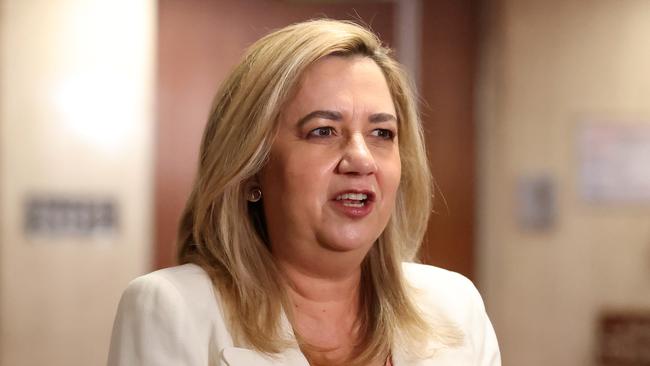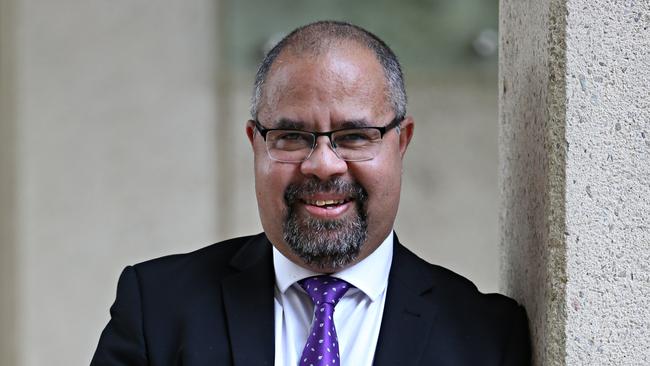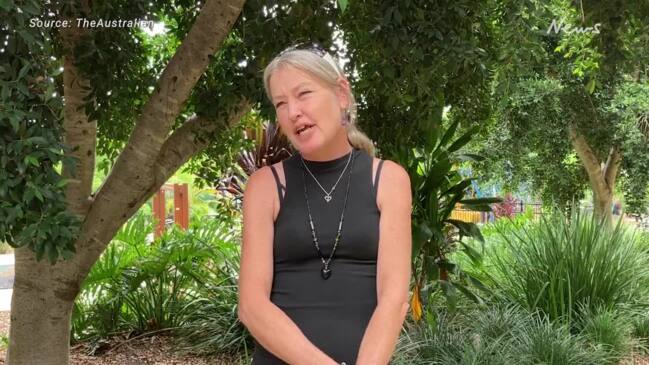Queensland Premier Annastacia Palaszczuk dodges disciplining ‘Call me Sir’ MP Jim Madden
In the wake of the ‘Call me Sir’ MP scandal, what is Annastacia Palaszczuk’s threshold for having MPs removed from her party? Explore how the Premier has handled scandals dating back to 2015.

Annastacia Palaszczuk was lost for words. Outside a closed-door caucus meeting at the Queensland parliament on Monday, the Premier was struggling to articulate her threshold for asking Labor Party HQ to expel an MP.
“This well – in terms of – in relation to – well it has to be … very serious,” she told Inquirer. “Um, a very serious offence.”
Asked to clarify whether she meant a criminal offence, or serious allegations, she said: “Well, they have to meet the party’s thresholds to get through the selection panel, which is very high. So those processes start in the lead-up to (an election) campaign.”

The following day, embattled Ipswich West MP Jim Madden attempted to save Palaszczuk the political trouble, telling parliament he wouldn’t be standing for re-election next year.
It was a decision he attributed to his mental and physical health, and not the allegations against him – uncovered by The Australian – of workplace bullying and inappropriate touching of staff in his electorate office, and coercive control of his former partner.
A year-long internal Labor investigation, conducted by a Brisbane barrister, had found Madden committed 22 breaches of party rules in his treatment of electorate officer Alison Young, who also had an approved WorkCover claim against him.
Madden – who engaged Maurice Blackburn to defend him during the ALP probe – was not expelled by Labor state secretary Kate Flanders. He was “reprimanded” and made to undergo one-on-one anti-bullying and harassment training.
For the first time this year and after many requests for comment, Madden responded to Inquirer, repeating much of what he said in parliament this week in announcing his health-related retirement. “I consider a number of defamatory statements have been made about me in public reporting referring to me. I will not fight a campaign of unparticularised allegations made by unidentified persons in the media,” Madden said.

So what is three-term Premier Palaszczuk’s threshold for demanding one of her MPs be kicked out of the party she leads?
Known to be risk-averse, and with little appetite for picking internal fights, Palaszczuk has rarely exercised her disciplinary power as ALP leader. In many ways, she’s factionally hamstrung. A leader from the Right faction, she is cowed by the dominant Left and the party’s most influential powerbroker, United Workers Union boss Gary Bullock.
Inquirer has taken a look back at Palaszczuk’s handling of political scandals since she was elected in 2015.
Not even two months after she was sworn in as Premier in February 2015, Palaszczuk’s authority was tested. It emerged that Billy Gordon, the newly elected MP for Cook and only the second Indigenous person sworn into Queensland parliament, had failed to disclose his juvenile criminal history to both the ALP and Palaszczuk, and had neglected to pay child support.

At a press conference in Townsville, a defiant Premier said she had asked ALP state secretary Evan Moorhead to sack Gordon from the party, and advised the backbencher to resign immediately.
A line was crossed, she said at the time, when Gordon “was dishonest with me”.
“I’ve always maintained integrity is fundamental to any government that I lead. Today I am prepared to put my premiership on the line,” Palaszczuk said, on March 29, 2015.
“I have campaigned on integrity and accountability. I have modelled myself in the tradition of Wayne Goss and his stance on integrity and accountability and I will not put that to the side for one single moment.”
In stamping her authority on the party so early in her term, Palaszczuk was also taking a rare and enormous political risk. Her Labor government had a one-seat working majority in the parliament, and governed only with the support of independent Speaker Peter Wellington.
By kicking Gordon out of the party and encouraging him to quit parliament, a by-election in the seat of Cook could have led to the defeat of her government just months after its historic victory over Campbell Newman’s one-term LNP administration.
Gordon – who died suddenly late last year – ultimately remained on the crossbench for the rest of Palaszczuk’s first term, and her shaky grip on power remained.
The Premier’s swift and decisive handling of the Gordon affair is an anomaly. She has only ever recommended one other Labor MP be disendorsed.
Palaszczuk pulled the trigger on Rick Williams, a first-term MP for the Bribie Island-based electorate of Pumicestone, on October 31, 2017, more than two years after the first contested allegations of bad behaviour against him surfaced, including that he forged financial documents and sexually harassed a teenage employee. Williams disputed the allegations, and a 12-month police investigation had already concluded there was not enough evidence to support them. Palaszczuk said allegations that Williams threatened a local newspaper owner – which he denied – were the “final straw” to lead her to disendorse him as a Labor candidate.
The Premier now had the impetus she needed to call an election, two months early, and Williams quit the party.
He claimed Palaszczuk had strung him along to keep him in the ALP fold, before finally getting rid of him at a time that suited her politically.

A month before Palaszczuk unceremoniously dealt with Williams, she was welcoming Mark Bailey back into her cabinet.
Bailey was then a first-term MP who had skyrocketed into the ministry with the backing of powerful Left faction union bosses Peter Simpson and Gary Bullock after the 2015 election.
Unbeknownst to the public, he’d been keeping up back-channel communication with Electrical Trades Union leader Simpson via his private email address, mangocube6@yahoo.co.uk, including about a $13bn proposed merger of two superannuation funds.
An investigation by The Australian uncovered some of the emails, but Bailey deleted his email account after his office received a Right to Information request from this newspaper.
In July 2017, the Crime and Corruption Commission found there was a “reasonable suspicion of corrupt conduct” in Bailey’s deletion of public records, forcing Palaszczuk to stand Bailey aside from cabinet. By September, the CCC had reported, clearing Bailey of corruption but slamming his deletion of his private email account as foolish, injudicious and a technical breach of the law. He also breached the ministerial handbook.
Bailey was not charged because the CCC managed to recover the public records by reviving the email account.

Despite the criticism from the CCC, Palaszczuk invited Bailey back into her ministry. “He apologised to me, I have accepted that apology and now I want him to get on with his job,” Palaszczuk said.
By the time Palaszczuk’s second term rolled around, there was no one more talented, targeted or trouble-prone in her government than Jackie Trad – leader of the Left faction, deputy premier, treasurer, and the eventual subject of three CCC probes.
The first was sparked by Trad’s failure to properly declare an investment property bought by her family company, near a planned station of the government’s signature infrastructure project, the Cross River Rail. She was found to have broken ministerial rules, but was cleared of corruption.
Trad resigned as deputy premier and treasurer in May 2020 when the CCC announced a formal investigation into allegations she had interfered in the appointment process of a school principal in her electorate. She denied any wrongdoing and was eventually cleared. But in the end, it wasn’t Palaszczuk who pressed for Trad to leave the ministry; she resigned only after losing the support of crucial powerbroker Bullock.

Trad lost her seat of South Brisbane to the Greens at the October 2020 election. She is now fighting to suppress a CCC report investigating whether she improperly intervened in the appointment of a top public servant; she denies wrongdoing in that case.
An agronomist, solicitor and local councillor, Jim Madden was elected to the super-safe ALP seat of Ipswich West in 2015, as Palaszczuk improbably returned Labor to government after its worst-ever defeat in 2012.
Despite his ambitions to serve in Palaszczuk’s cabinet, particularly as agriculture minister, Madden has not risen beyond the backbench. Some say he is an effective local member.
During a months-long investigation, Inquirer has spoken to eight former Madden staffers, as well as many more people who know him well. Each of the former staff say they witnessed Madden’s bullying and unpredictable behaviour. All say the MP’s poor treatment of workers was an open secret in Labor circles, even before it was made public.
In addition, serious allegations of coercive control have been levelled at Madden by his partner of several years, Sarah Grist.

A full-time carer for her disabled son, Grist has described how Madden made her call him “Sir”. In communications between the pair seen by Inquirer, he also referred to himself as “Sir,” a hallmark – Grist says – of the great power imbalance in their relationship.
Grist says Madden paid for her ALP membership in mid-2018 and manipulated her into taking the jobs of secretary and treasurer in his local ALP branch. He instructed her how to vote. She says he required her to sign off on financial statements without reading them, despite her objections and her concerns she did not have the capability to fulfil the roles.
Grist has epilepsy, so cannot drive. She relied on Madden to pick her up and take her to meetings. If he decided she wasn’t required, he did not turn up.
“I was coerced into acting how he wanted, in order to benefit him alone,” Grist says. “If the party continues to accept this behaviour from their MPs, they really do need to admit there is clearly some level of acceptance of coercive control within their party structure, and that their actions don’t match their words.”

Palaszczuk’s government has staked its credibility and legacy on reform of domestic violence laws, and its handling of issues that are vital to the lives of women.
A hallmark of Palaszczuk’s third term has been her promise to legislate to create a new criminal offence to outlaw coercive control, a pattern of oppression that experts warn can be among the most dangerous of domestic violence behaviours.
Asked this week what she would advise Grist to do about her allegations, given the government has not yet legislated the new offence, Palaszczuk said: “I’m not advising her, it’s a matter for her to make any allegations to the police. I’m not the police.”
Palaszczuk continues to insist she holds her MPs to the highest standards.
For Madden’s former staffers, there’s a sense of betrayal. Some feel not just betrayed by the politician, or the parliament that employed them as electorate officers, but by the party they’ve dedicated their lives to.

Alison Young worked for Madden as electorate officer from September 2018 to October 2021, and alleges he bullied and harassed her. She was diagnosed with PTSD and anxiety after her stint in Madden’s office and made a successful WorkCover claim.
A 20-year member of the Labor Party and president of the Bundamba branch, Young agonised over the decision to speak out publicly. She wants to see Madden expelled from the party she loves, and has a message for Palaszczuk: “The behaviour you walk past is the behaviour you accept.”
Know more? elkss@theaustralian.com.au





To join the conversation, please log in. Don't have an account? Register
Join the conversation, you are commenting as Logout